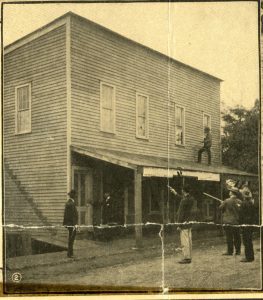

The 2024 National Summit of Transformative Memorialization, hosted by The National Center for Civil and Human Rights in Atlanta, brings together direct practitioners and experts from across the US dedicated to memorialization efforts related to forced labor and racial injustice. This year’s theme, “Unturning the Stones,” emphasizes the critical task of exploring the complex histories of America’s past and their ongoing impact. This event will take place August 8-9 at The Center. Click below to learn more.
The National Center for Civil and Human Rights requests proposals from mural artist(s) or artist teams to create an original art mural on the west side of Atlanta, Georgia – memorializing its historical geographic significance to the practice of forced labor in the post-Reconstruction era. This project is sponsored by the Westside Atlanta Forced Labor Memorialization Microgrant Fund, led by the Truth & Transformation Initiative. The application for this commission opens on Monday, July 8, 2024, and closes on Monday, August 12, 2024, at 11:59 PM. Please read the PDF below for additional details.
The Truth & Transformation Initiative is dedicated to teaching a more comprehensive and honest account of the past. It highlights the ways communities across the United States have gathered and mobilized around painful parts of our shared history, seeking to learn from them in an effort to help transform our society.
In the period after the Civil War and the formal end of slavery, Jim Crow flourished in the South, and efforts to enforce racial hierarchies in America took on new forms of violent and abusive practices. Political and civic leaders executed these practices- in particular, convict labor and lynching- to reverse strides toward equality and deny African American communities the ability to exercise newly attained citizenship rights of the Reconstruction era.
 The Center’s Truth and Transformation Initiative was created to bring awareness to the issues of racial terror and forced labor in the city coined “too busy to hate,” Atlanta, Ga. The initiative aims to investigate the facts and locations of historical events and correct the narratives told in newspapers, books, film, and other mediums. This work is done by convening a coalition of community, historians, and politicians to create new memorials, mark historic locations, and appropriately commemorate the legacies of those impacted by the brutal history in our city. The Initiative’s creators believe by facing the past with honesty and integrity, we can transform ourselves and our societies to commit to equity for our future and address longstanding inequalities.
The Center’s Truth and Transformation Initiative was created to bring awareness to the issues of racial terror and forced labor in the city coined “too busy to hate,” Atlanta, Ga. The initiative aims to investigate the facts and locations of historical events and correct the narratives told in newspapers, books, film, and other mediums. This work is done by convening a coalition of community, historians, and politicians to create new memorials, mark historic locations, and appropriately commemorate the legacies of those impacted by the brutal history in our city. The Initiative’s creators believe by facing the past with honesty and integrity, we can transform ourselves and our societies to commit to equity for our future and address longstanding inequalities.
This initiative has two major strands:
Government entities and private businesses colluded to re-enslave black men, women, and even children by falsely convicting them of crimes and sentencing them to labor. This practice, known as convict labor, became a lucrative industry, with prison labor camps and convict-leasing programs reinstating bondage for generations after the war ended. In Atlanta, these heinous acts took place at Bellwood Quarry and the Chattahoochee Brick Company. Learn More.
Five-hundred documented lynchings occurred in Georgia between 1877 and 1950; twenty-five of these murders happened during a four-day eruption of violence in Atlanta in September 1906. The 1906 Atlanta Race Massacre is largely unknown today, despite being a defining moment in the local and national history of racial terror. The Truth and Transformation Initiative uses EJI’s innovative community remembrance approach. We work with grassroots organizations and historians to confront the legacy of the Massacre so that Atlanta may commemorate the past to acknowledge a more complete, inclusive account of our shared history. Learn More.
Words can have a profound impact on our understanding of hidden or erased history. Check out our Truth & Transformation Glossary to learn more key terms, dates and individuals related to forced labor, both in Atlanta and the United States.
Forced Labor at Chattahoochee Brick Company and Bellwood Quarry. The Center is working with a group of stakeholders to honor the men, women, and sometimes children who were forced into labor through a practice called convict leasing, which took place at the Chattahoochee Brick Company and Bellwood Quarry, the centerpiece of Westside Reservoir Park in Atlanta. Read an article about the project in Axios Atlanta.
The 1906 Atlanta Race Massacre. Over four days in September 1906, at least 23 African Americans were killed and hundreds more were injured in the largest outbreak of racial violence in Georgia history. The massacre is largely unknown today, even though it is a defining moment in Atlanta history — and our nation’s history of racial terror targeting African Americans. Read an article about the project from the Associated Press. Read an article about the project from the Associated Press.